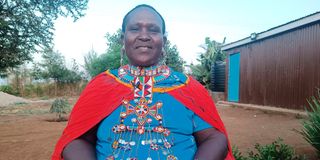Breaking patriarchal chains: Widow turns 30 acres into prosperity

Esther Sankau at her home in the village of Noomayianat in Kajiado South Sub-county, Kajiado County, during the interview on June 6, 2024.
What you need to know:
- Esther Sankau, married as a child in the Maasai community, fought for over a decade to retain 30 acres of land left by her late husband, defying patriarchal traditions that deny widows their inheritance.
- In 2021, she partnered with an investor to transform the disputed land into a thriving farm, securing her ownership and providing for her children's education, thus challenging deep-rooted cultural norms.
"I was married before I even turned 12," recalls Esther Sankau, her voice tinged with a mixture of sadness and resilience.
Born in Mbironi and married off to a neighbouring village in Noomayianat, Kajiado South sub-county, Esther's story is a testament to the harsh realities faced by many girls in Kenya's pastoralist Maasai community.
The consequences of defying her father's decision to marry her off to a man old enough to be her father were severe.
"I was terrified when my mother told me of my father's intention," Esther remembers. "I didn't know what being a wife meant, but I dared not disobey him. The punishment for resistance was brutal - he'd tie my mother and me to a tree and whip us mercilessly."
Denied an education that could have potentially shielded her from child marriage, Esther's role in her new home was clear: tend to livestock, bear children, and care for her husband. "There was nothing else to do," she says with a wry laugh.
Read also: The changing lives of Maasai women
However, Esther's life took a dramatic turn in 2010 when her husband passed away, leaving her with six children - four daughters and two sons. The devastating drought had wiped out their livestock, leaving Esther with no skills to secure a job and support her family. The only asset remaining was a substantial piece of land - 30 acres, all in her late husband's name.
This is where Esther's real struggle began. Her brother-in-law, adhering to the patriarchal Maasai culture, attempted to claim the land. "He couldn't fathom how a Maasai woman could inherit such a large piece of land," Esther explains. "In our culture, a woman belongs to a man, and when he dies, his property goes to his father or brothers. A woman can only use it under their authority."

Esther admires her banana plantation at her home on June 6, 2024.
For nearly 12 years, Esther was unable to use the land due to this conflict. "He tried hard to evict me, even resorting to physical violence," she recounts. "But I had to persevere for my children. Where else could we go? It was a period of indescribable misery and hardship."
Esther's story mirrors that of thousands of widows in Kenya who face ejection from their matrimonial homes and land upon their husbands' deaths. The situation is particularly dire for those lacking education and income, as they often don't know how to seek legal redress.
Population growth
While recent figures on widows in Kenya are scarce, the World Bank estimates that one in 10 women aged 14 and above in Africa are widowed. The Loomba Foundation's 2015 World Widows Report ranked Kenya 33rd out of 39 countries with more than one million widows, recording 1.4 million at the time. This number has likely increased due to population growth and recent crises like the Covid-19 pandemic and severe droughts.
The 2022 Kenya Demographic and Health Survey reveals that nearly half (48.6 percent) of widows in Kenya own land. However, as Esther's case demonstrates, this ownership often comes with immense struggles. It's worth noting that denying a widow access to property left by her husband is a crime under the Protection against Domestic Violence Act (2015).
The hardships Esther faced had a ripple effect on her family. Three of her daughters, unable to bear the toxic environment and lack of resources, opted for early marriages. "I was heartbroken," Esther admits. "My dream was to see them go to university."
But then, a turning point arrived. In 2021, an investor approached Esther with a proposition for a farming partnership. She quickly accepted, and they signed an agreement. The investor also managed to neutralize the threats from her brother-in-law.
"The investor drilled a borehole, crucial in our semi-arid area, cleared the farm, and we started cultivating," Esther explains. "We rotate between tomatoes and beans."
With her first share of the proceeds, Esther took a significant step - she transferred the land's ownership to herself. The investor guided her through this process, connecting her with a lawyer who assisted with the land transfer.
Today, Esther stands proud. Her daughter has completed a degree in procurement and is job hunting. "I'm a happy mother," she beams. "I've fenced my compound and even grow bananas and fruits. But my joy will be complete when all my children finish school and succeed in life. My sons are now in junior high school. I don't want them to suffer as I did."
Esther's journey from child bride to landowner and successful farmer is a powerful narrative of resilience, determination, and the transformative power of economic empowerment for women in patriarchal societies.





